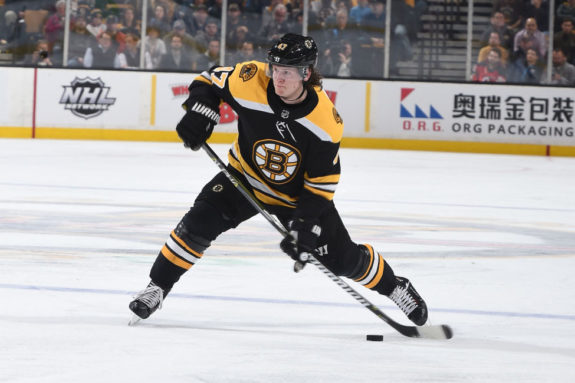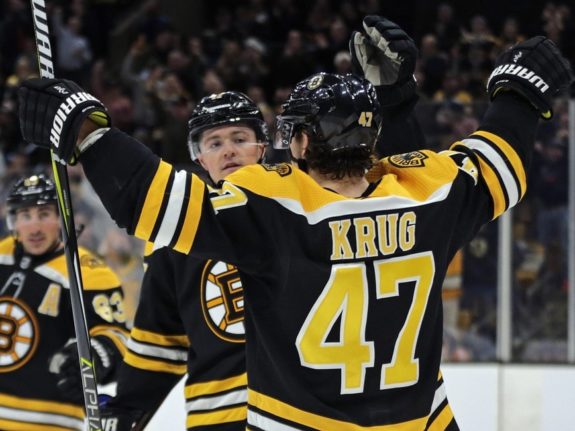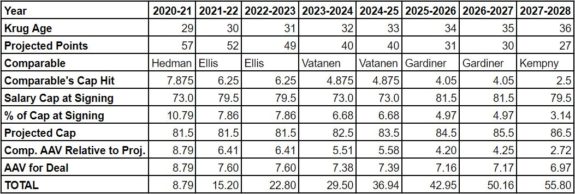The recent ratification of the NHL’s Return to Play protocol, along with an extension of the Collective Bargaining Agreement, was excellent news for hockey fans everywhere. While most of it was positive, one cause for concern is that the salary cap will remain flat for at least the next two seasons. That means the Boston Bruins might not be able to re-sign pending unrestricted free agent (UFA) defenceman Torey Krug. The following is a deep dive into the negotiations including from Krug’s camp, the organization, and a contract projection based on league comparables.
Krug’s Camp
Krug’s point of view presents the simplest approach to this negotiation. Like any player, he is likely seeking as much long-term security as possible, along with the highest level of compensation. While he has stated that he would consider taking less money to remain in Boston, there must be a limit to the hometown discount he is willing to accept.
Heading Home?
Speaking of hometowns, the popular rumor is that Krug would be interested in signing with his childhood team, the Detroit Red Wings. The Red Wings would likely be willing to offer the Michigan native more term along with a higher annual average value (AAV), as they have over $35 million in projected cap space available for next season. While the contract may be more alluring than what the Bruins can offer, there are a few major hurdles that the Wings may not be able to clear.

It is unlikely that a coveted UFA would make the jump from a Presidents’ Trophy-winning club to the league basement. A fall from such heights is reserved for Mick Foley, and would likely require some assistance from the Undertaker. Wrestling references from the 1990s aside, it’s doubtful that Krug would want to leave the Bruins, especially not for a rebuilding club. With a reasonable chance of securing a spot on the US Olympic team in 2021, Krug will want to surround himself with a strong supporting cast and put himself in the most advantageous position to make the team.
Build a Bridge
Alternatively, with a flat cap, Krug may opt for a one or two-year bridge deal in the hopes that the NHL’s economic landscape improves. If he continues to produce at an elite level offensively over that time, he may be able to leverage a more lucrative deal if or when the salary cap increases. Those are two very big IFs. Although this route remains an option, Krug is more likely to play it safe and sign a deal that offers greater security in these uncertain financial times.
The Bruins Organization
The Bruins’ side of the negotiation may be slightly more complicated. While the B’s will likely try to squeeze Krug as much as financially possible, they may be of two minds when it comes to term. This is not simply a situation of keeping a talented young asset in the organization as long as possible. Approaching 30 years of age, Krug’s most productive years are likely behind him.

Despite notching at least 39 points in every season of his career, and stringing together four consecutive 50-plus-point campaigns (prorated), most aging models project Krug to steadily regress each season moving forward. With that in mind, the Bruins’ most prudent course of action may be to pursue a short-term pact. Krug is unlikely to be interested in signing for less than seven or eight years, so each season the Bruins shave off of the deal will cost them in the AAV department. The wiggle room may be found if the Bruins are willing to tack a few extra years of security onto the deal.
The Numbers Game
Although both sides seem keen on making the numbers work, there are a few factors working against an extension. With just under $18 million in projected cap space, the Bruins have to consider several other notable players with expiring contracts. Zdeno Chara (UFA), Joakim Nordstrom (UFA), Kevan Miller (UFA), Jake DeBrusk (RFA), Matt Grzelcyk (RFA – arb.), and Anders Bjork (RFA – arb.) will be seeking new contracts when free agency (tentatively) opens on Nov. 1. If Krug’s salary demands do not fit within the team structure, the organization may have some difficult decisions ahead.
Related: Bruins 2018 Draft Class Update
Ultimately, if the two sides aren’t able to come to an agreement on an extension, the Bruins may be able to replace Krug’s puck-moving abilities in-house. While Charlie McAvoy is an obvious candidate to replace Krug on the B’s top power-play unit, Grzelcyk looks poised to absorb some of his even-strength minutes.

Although both defenders continually rank among the best in the league across a number of key possession metrics, Harman Dayal’s recent article in The Athletic reveals Grzelcyk is criminally underrated (from ‘By the Numbers: Identifying the NHL’s best puck-moving defensemen’, The AthleticNHL – 9/7/2020). While McAvoy is understandably viewed as the future of the organization, Grzelcyk’s underlying possession numbers (46.7% PossessionExit%, 14.8 PossessionExits/60) indicate that he is ready to take on more responsibility.
Contract Projection
Projecting a contract can be difficult in the best of times, let alone when the league stands to lose up to a billion dollars due to the COVID-19 shutdown. The salary cap remaining flat for the next two or three seasons will have an impact on UFA negotiations, but the extent of that impact is still unknown.
Related: The TJ Oshie Trade Analyzed
The chart below factors in a flat cap for three seasons, with moderate increases over the next five. Krug’s projected points are based on age-related regression data collected across the league from 2008-2016. Comparable players were then selected based solely on offensive production, as it is difficult to find all-around comparables for Krug. The chart shows the AAV as well as the total value of a contract based upon a potential term of one to eight seasons.

A Reasonable Compromise
In the end, the two sides will likely settle somewhere around six years worth roughly $7 million per season. This gives Krug some long-term security, while also giving the club a manageable cap number. Although it is reasonable to suggest that Krug will be overpaid in the final few seasons of the deal, it is also likely that he outperforms the AAV through the first few. Ultimately, both sides will need to compromise to get this deal across the finish line. Krug will need to sacrifice some salary for security, and the organization will have to cough up an extra few years in order to fit the deal into their team salary structure.